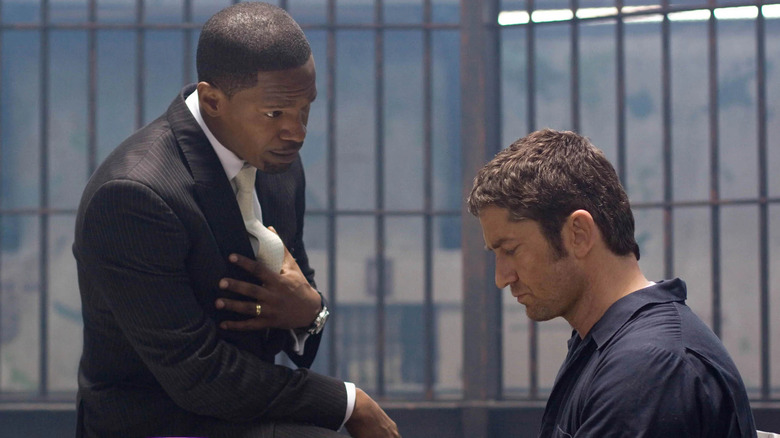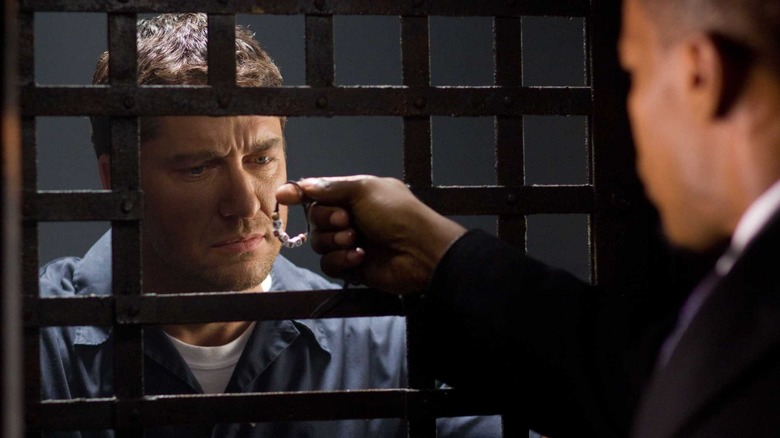Law Abiding Citizen Writer Thinks El Chapo Modeled His Real-Life Prison Break On The Movie
This post contains spoilers for the 2009 film "Law Abiding Citizen."
F. Gary Gray's 2009 police thriller "Law Abiding Citizen" is a goofy little potboiler with a fun premise. Gerard Butler plays a man named Clyde who witnessed his family murdered. The murderer, thanks to mishandled evidence and an indifferent legal system, received a light sentence. Years later, Clyde sets about an elaborate counter-plan to expose legal corruption and murder all the people who caused him pain. Even after Clyde is apprehended and put into prison, the murders continue on the outside. Jamie Foxx plays the lawyer who attempts to understand Clyde, the nature of his plan, and who his accomplices might be.
The twist at the end of "Law Abiding Citizen" is that Clyde has somehow constructed a series of tunnels leading in and out of his prison's solitary confinement cells. He has been sneaking out of prison in order to continue his acts of violent vengeance, confusing everyone. Luckily, the Foxx character gets the drop on him and ends his reign of terror. One might also hope that Clyde's intention of exposing the legal system's overall indifference was at some point addressed.
"Law Abiding Citizen" was written by Kurt Wimmer, the director of clever sci-fi films like "Equilibrium" and "Ultraviolet." He also wrote the screenplays for "Street Kings," the remakes of "Total Recall" and "Point Break," and the excellent spy thriller "Salt." His most recent film, as both writer and director, is the new "Children of the Corn," the 12th film to be based on Stephen King's short story about a cult of murderous children ... and corn.
/Film's own Jack Giroux recently interviewed Wimmer, and the filmmaker stepped up to defend "Law Abiding Citizen," a film he suspects inspired the real-life criminal El Chapo.
Unlikely, but possible
Giroux asked Wimmer about his propensity for "movie logic," that is: stories that are over-the-top for real life, but still feel weirdly in the realm of possibility. Wimmer explained that his screenplays all abide by a very strict code of inner logic, even if they're set in a sci-fi universe, or if they begin to spiral out of control into action bonanzas. He even argued that "Law Abiding Citizen" was so plausible that a known criminal imitated it after the film's release. He said:
"I believe my scripts are logical because they're not about quantum mechanics. I believe that they're fundamentally logical. I mean, if you want to say, 'Well, how does somebody dig a tunnel into jail,' it actually turned out that El Chapo did it. Now, he did it after 'Law Abiding Citizen.' I think he copied the movie, but they literally tunneled into jail. So, these things are possible. They're unlikely, but they're possible."
Joaquín "El Chapo" Guzmán is the ex-leader of the Sinaloa drug cartel, who is currently serving a life-plus-30-years prison sentence. Guzmán was known for his tunnels and frequently used underground passages to transport drugs in secret. In 2014, Guzmán briefly evaded arrest via a secret network of tunnels underneath his and five other people's homes. In 2015 — and this is the part that sounds like Wimmer's idea — Guzmán escaped from prison by making a large, well-lit, well-ventilated tunnel with a motorcycle in it. It was posited that he was sneaking in and out of prison to continue his drug trade. Oh yeah, and he escaped prison again via a tunnel in 2016. The dude loved to burrow.
There is no evidence, however, that Guzmán was familiar with "Law Abiding Citizen."
They're only movies
Wimmer seems to have a pragmatic view of movies vis-à-vis their realism. He understands that logic, especially in genre cinema, isn't to be deeply honored. Indeed, any fictional film, especially broad mainstream Hollywood entertainment, is going to rest in the realm of heightened and unrealistic melodrama. The important connection to cinema comes when the audience agrees to suspend their disbelief and pretend that the film they're seeing is, on its own level, "real." Once that unspoken agreement has been made, any issues of real-world logic can be ignored, and the audience can enjoy the action, the humor, the drama, and the "big moments" that they will best remember.
Wimmer put it thus:
"Here's the thing: You are going to the movies to be entertained. I know it. I want to be entertained when I'm writing it. I also know that you get no points whatsoever for logic if it's sacrificed for ... you know, I love 'The Matrix,' but come on, humans as batteries? I mean, why didn't they use elephants? That seems like it makes a lot more sense. How about fish? There's millions of fish out there. By the way, who put Joey Pants into the Matrix to eat that steak? I don't care, because it was entertaining, right?"
"Joey Pants" is a reference to actor Joe Pantoliano, the turncoat in "The Matrix" who inserted himself into a simulated reality to enjoy a virtual steak while betraying his friends. The evil sentient machines in "The Matrix" had imprisoned humanity and kept them in a simulated world in order to sap electrical impulses from their brains. Wimmer isn't wrong to point out that elephants would have made better batteries.


